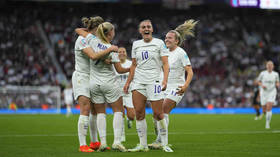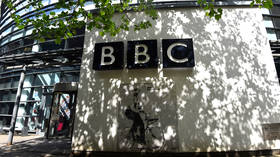BBC presenter says England women’s team is too white (VIDEO)

A BBC pundit has provoked debate in the UK by criticizing a perceived lack of diversity in the England women's national football team at Euro 2022.
The tournament is currently being held on English soil and is heading to its final group games.
After England's record 8-0 hammering of Norway this week, Scottish presenter Eilidh Barbour chose not to dwell on the qualities of the victory in a broadcast the following evening, and instead looked to pick holes in the racial make-up of the England squad.
"It was a historic eight-goal victory for England last night as the Lionesses secured their place in the quarter finals," Barbour conceded.
"But all starting 11 players and the five substitutes that came on to the pitch were all white.
"And that does point towards a lack of diversity in the women's game in England," she added, before introducing a segment looking at racial diversity led by black ex-Arsenal and England player Alex Scott and named 'Football Beyond Borders'.
I'm sorry, what? There's a problem with the England women's team in the #WEUROS2022 being too "white"? Which players should be dropped because they have the wrong skin colour?Just extraordinary that a BBC presenter can say this and still be in her job! pic.twitter.com/PBpOC8tMhs
— Julia Hartley-Brewer (@JuliaHB1) July 14, 2022
Barbour's remarks have been widely-discussed in the British press and on social media, with one writer for the Daily Mail accusing the BBC of launching "yet another bid to stoke racial divisions in this country."
"Surely, any manager should pick the best players for the team on any given day, regardless of their skin color or ethnicity," it was suggested.
On Twitter, divisive breakfast show host Julia Hartley-Brewer asked: "I'm sorry, what? There's a problem with the England women's team in the women's being too "white"?
"Which players should be dropped because they have the wrong skin color? Just extraordinary that a BBC presenter can say this and still be in her job!"
"What the f*ck exactly does this presenter want the English coach to do if the 15 most talented/tactically appropriate players for the match happen to be white?" asked a different author of a separate popular post sharing the comments.
"Jeopardise the score in the name of 'diversity'? The BBC are a joke," she finished.
"It is a racist comment, and totally inappropriate in this day and age. People have been sacked for much less," pointed out another onlooker.
"The BBC is a woke waste of time. Not sure why anyone watches it?" posed someone else.
A Football365 report searched for explanations for the perceived lack of representation which threw up some interesting facts and observations.
For example, 43% of players currently plying their trade in the men's Premier League are black, while in its female equivalent, the Women's Super League, this falls to less than 10% or 29 players out of a total 300.
With England heavily dependent on the Super League for players, it makes sense that there will therefore be low black representation at international level too.
Furthermore, there aren't the same support models in place for young female players irrespective of race as there are for their male counterparts, which leads to high drop out rates.
The problem is also not uniquely English, with cultural melting pot the USA, whose women's team are the most successful women's international outfit of all time, facing the same questions as do the Netherlands despite players of Surinamese descent dominating the racial makeup of the men's national team and male club outfits.
Barbour's comments came just a couple of days before BBC News had to issue an on-air apology for wrongly showing a picture of black Chelsea star Raheem Sterling when airing a segment about an unnamed male Premier League player who has recently been arrested on suspicion of committing sexual offenses.
As the diversity row rages, the Lionesses will continue their Euro 2022 campaign by playing their final group game against Northern Ireland on Friday.













